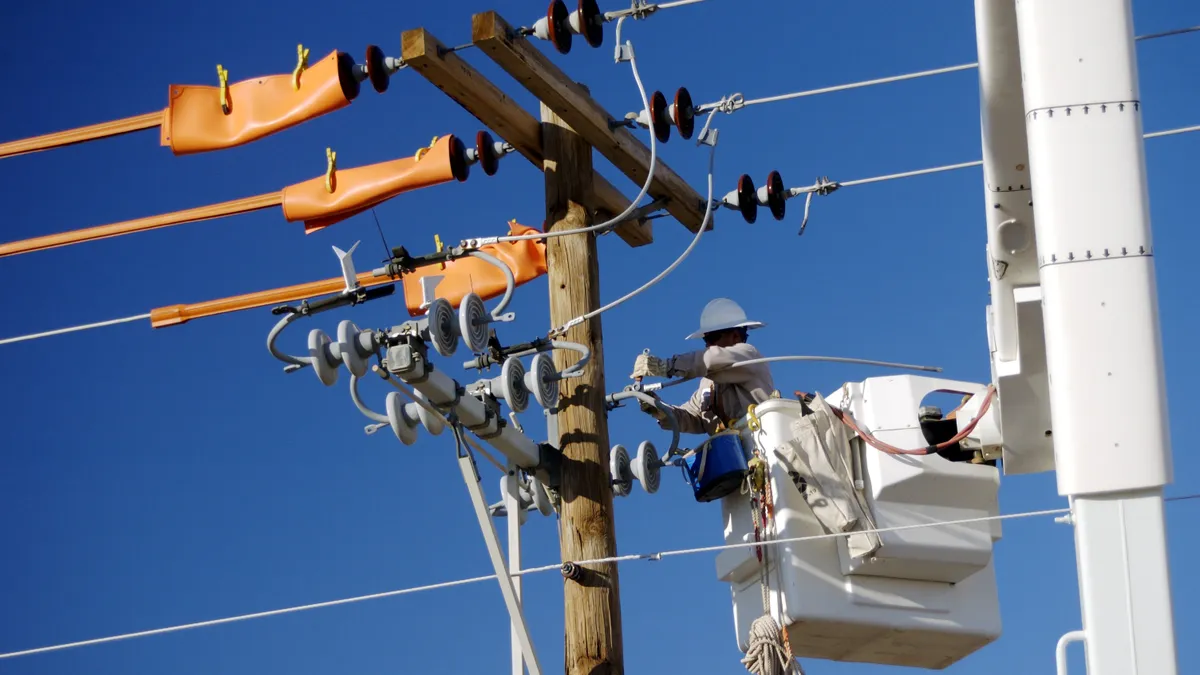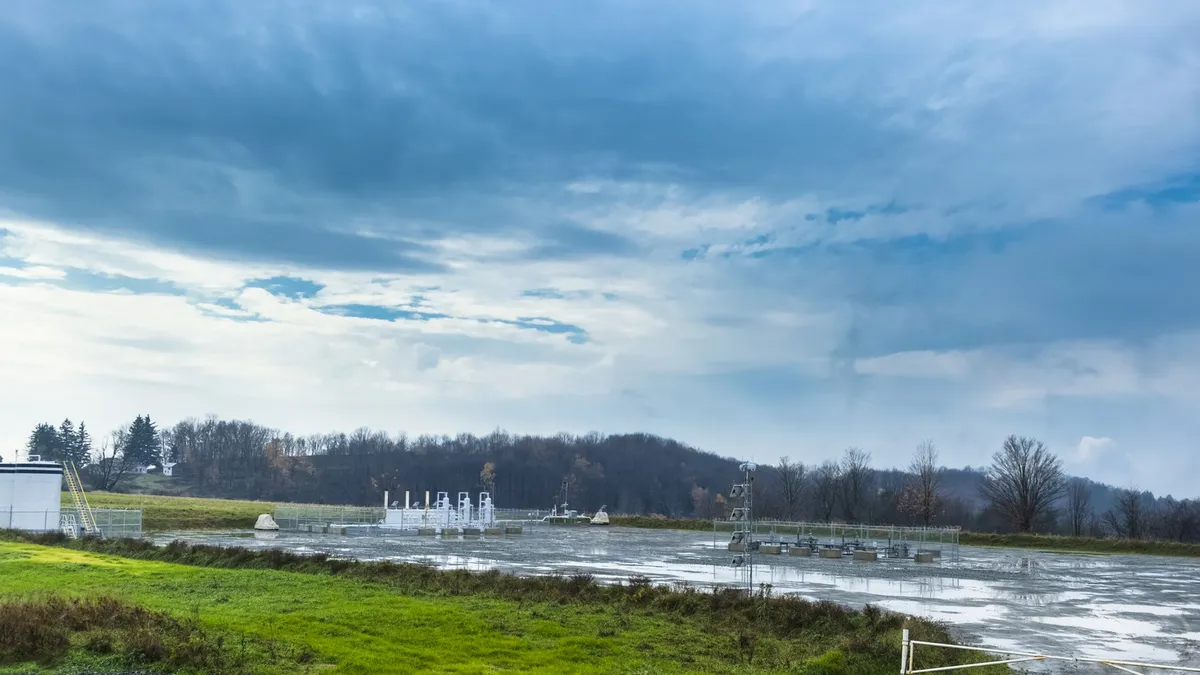Electric cooperatives are at risk of losing their not-for-profit, tax-exempt status due to the language of a 2017 tax law. The impact was "unintended," but co-ops in already vulnerable communities are suffering, according to Louis Finkel, SVP of government relations at National Rural Electric Cooperative Association (NRECA).
The large federal tax package changed how government funding is viewed, ensuring companies that receive large incentives and grants from state and federal governments would be taxed. But this puts not-for-profit electric co-ops in a difficult place: having to choose between maintaining their tax-exempt status or recovering large expenses from disaster aid relief.
"This was clearly an unintended consequence."

Louis Finkel
SVP of government relations, NRECA
Not-for-profit community-owned utilities have large grants and small customer bases, meaning they would be badly impacted by having to pay taxes on federal and state grants, and Congress is aiming to redress it. Hundreds of thousands of dollars are on the line for individual co-ops, which is a large burden given their small annual budgets.
That's why NRECA is calling this "their biggest policy priority."
The Internal Revenue Code was changed by the 2017 tax law to address large companies receiving millions in economic development incentives, such as the benefits a tech giant might receive to move their headquarters to a certain county. "But the way they phrased it, any public grant ... would be taxable," Tim Johnson, CEO of Otsego Electric Cooperative, told Utility Dive.
"This was clearly an unintended consequence. [Members of Congress] didn't believe they were going to capture us" in the 2017 changes, NRECA's SVP of government relations, Louis Finkel, told Utility Dive.
"We are lockstep on this," Finkel said of NRECA's membership, which includes some large generation and transmission operators and a few members that made the decision to be taxable. "Our membership is totally galvanized and fully supportive."
Two bicameral bills were introduced in April to correct the issue, but as the year draws on, more of NRECA's members are feeling the pressure of losing their tax exempt status for 2019.
Bipartisan progress on fixing a mistake
NRECA and its members are targeting any legislative vehicle available to retroactively change the tax law, to apply to the beginning of 2018.
"We are full speed ahead with executing on a campaign to make sure they take action this year," Finkel said.
Both the House and Senate versions have bipartisan co-sponsors. Sen. Rob Portman, R-Ohio, first introduced his version of the bill with Sen. Tina Smith, D-Minn., on April 4. The bill, S.1032, now has 35 co-sponsors, which Portman said reflects the broad support for the bill.
"No matter where you're from, there's a good chance that parts of your state wouldn't have access to high-speed, reliable internet without the services provided by tax-exempt rural co-ops," Portman said in a statement. "That's why a growing number of members of Congress support this common-sense legislation to ensure co-ops will continue expanding these broadband services."
Other co-ops, such as rural utilities in Florida, are also vulnerable to paying taxes on grants from the Federal Emergency Management Agency (FEMA) or the state equivalent, after responding to a natural disaster.
The House version, introduced by Rep. Terri Sewell, D-Ala., has 255 co-sponsors.
"We're continuing to advocate for its passage this year, but ... we don't expect it to come up for a vote this week," a staffer from Sewell's office told Utility Dive on Tuesday.
Once the bill reaches the threshold for immediate consideration, 290 co-sponsors, it can be brought to the House floor for a vote.
NRECA and its co-op members are making contact with members of Congress on a daily basis about this issue, Finkel said. "We've added roughly 150 of those co-sponsors ... since September 4."
Already feeling the impacts
Co-ops could accept government grants in order to bring meters back online after storms or to transition to cleaner energy. However, they will have to worry about how their members will pay for the taxes that are added to their power bills. One way to mitigate losing a tax exempt status, according to Washington Island Electric manager Robert Cornell, is to avoid collecting the grants for another year, which means some co-ops are leaving their debts unpaid and incurring interest that will be shifted onto their customers.
"We expect we will be in the position to potentially have to pay money we desperately need to recover back as taxes to the government as a result of this error in the tax code."

John Bartley
CEO, Gulf Coast Electric
Washington Island Electric Co-op, located in Washington Island, Wisconsin, might put off collecting state funds for one year in order to maintain its tax-exempt status for a little longer, according to Cornell. Wisconsin Gov. Tony Evers, D, included the island co-op in the state's 2019 budget, appropriating $2 million over the next two years to help with the $4 million repair of an underwater cable.
Already, the utility will owe about 30% of the state grants in taxes, which will have "a significant dramatic effect" on customers, according to Cornell. But paying extra interest on the accumulated debt by delaying the collection of the funds might be worthwhile to maintain the tax-exempt status.
Alaska-based Inside Passage Electric Cooperative won two grants totaling nearly $7 million to reduce its diesel fuel consumption by building a hydroelectric project. The Internal Revenue Service notified the co-op that it failed to meet the tax-exempt status for the 2018 calendar year by accepting the grants and owes $300,000 in federal income taxes. However, the co-op will be responsible for more based on tax penalties and the interest from unpaid debt, adding to the burden of its customers, according to NRECA.
Other vulnerable utilities are those still seeking disaster recovery. Some co-ops must balance delays from FEMA and state emergency relief programs for reimbursement on top of considerations of deferred collection to maintain their tax-exemption for as long as possible. To date, FEMA has rewarded Florida's Gulf Coast Electric $31 million of the $90 million spent on bringing back power after Hurricane Michael hit in October 2018, according to John Bartley, the co-op's CEO.
"We expect we will be in the position to potentially have to pay money we desperately need to recover back as taxes to the government as a result of this error in the tax code," Bartley told Utility Dive.
The rest of the funds may be available from FEMA in the next few years, he said.
"So even next year, when we received more money from FEMA, we'll be subject to paying some of that back... if this is not fixed and retroactively reinstated to cover the time periods in which we've received the money."
| Examples of nonprofit utilities vulnerable to the tax change | State | Grants | Metered customers |
|---|---|---|---|
| Otsego Electric Cooperative | New York | $10 million (state broadband development) | 4,600 |
| West Florida Electric Cooperative | Florida | $24 million (FEMA) | 25,000 |
| Gulf Coast Electric | Florida | $31 million (FEMA) | 21,000 |
| Washington Island Electric | Wisconsin | $2.6 million (state disaster recovery) | 1,200 |
| Inside Passage Electric Cooperative | Alaska | $3 million (federal), $3.92 million (state for fuel transition) | 1,350 |
| Douglas Electric Cooperative | Oregon | $10 million (FEMA)* | 10,000 |
* Recovery is still in discussion, but damage is estimated at $10 million
"If we have 4,000 members and you have to incur $1 million of taxes, that's $250 per member. It's a whack in the head," Otsego's Johnson said.
"We're all very frustrated with it ... [it's] an unforeseen consequence of doing what we thought was the right thing for our members," he added.
Otsego accepted two separate state grants totaling $10 million to bring broadband capabilities to its mostly rural members. The grants stipulated that the entire amounts must be spent on the project, so they cannot be applied to the taxes incurred, and the utility had to finish construction in two years.
Because of that, Otsego is considering taking out a loan to pay its taxes.
"We probably would have done our project anyway, but going in, we would have budgeted for it differently ... and spread it out over maybe more years," he said.






















